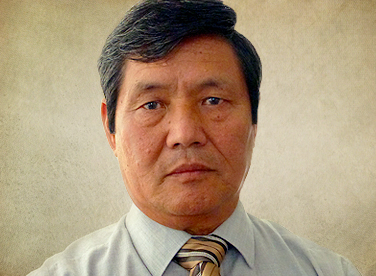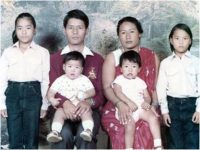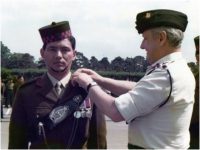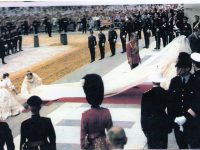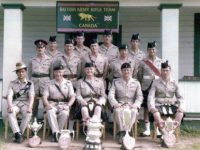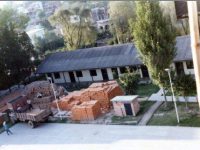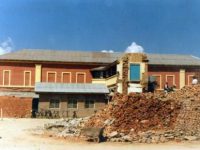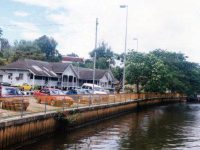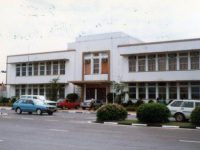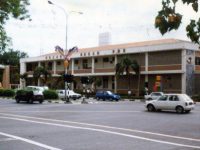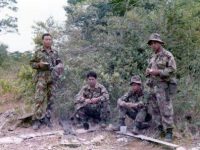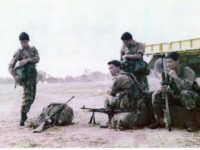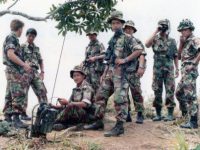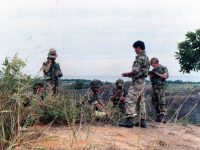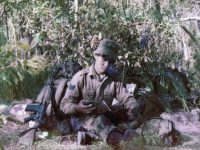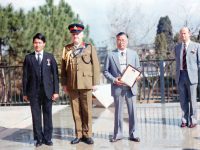Major (Ret’d) Satya Bahadur Pun, MBE
Major (Ret’d) (QGO) Satya Bahadur Pun, MBE
(Portrait © Gurkha Voices Oral History Project)
-
Satya & family in Hong Kong, 1984
-
Officer commission by Brig JL Chapple, UK, 1980
-
Line duty Royal Wedding 1981
-
Ottawa, Canada, 1981
-
'British Gurkha Transit Camp Offices,1988, Bikram Bhawan, Kathmandu
-
Demolishing old BG Training Centre, Bikram Bhawan, Kathmandu,1987/88
-
Tutong Police Station, Tutong District in Brunei taken 1999
-
Civic centre, Bandar Seri Begawan, Brunei where in Dec 1962 BG HQ 1/2 GR occupied (Photo 2000)
-
General Post Office, Bander Seri Begawan, Brunei from where D Company 1/2 GR personnel reacted to rebellion in Secretariat Building on 8 Dec 1962
54 years ago when Satya Bahadur Pun enlisted with the Gurkhas they were not permitted to join directly as an officer in the army. After promotion through the enlisted ranks, Satya was commissioned as an officer and eventually reached the rank of Major (Queen’s Gurkha Officer) which is the highest rank a Gurkha soldier can attain. On retirement at this rank then Gurkha Majors are awarded an honorary rank of Hon. Lt (GCO). He was awarded a Member of the Order of the British Empire (MBE) for services in the army and Nepal. The mountain village where Satya was born had no school and at the age of seven arrangements were made for him to live with his Uncle in the Terai (low lands), hundreds of miles from his home village, where he could attend the middle school.
Amongst Satya’s duties during his army career was to serve in line duty at St Paul’s Cathedral for the wedding of Prince Charles and Lady Diana Spencer in 1981. Satya’s audio extracts from his interview are accompanied by transcripts below.
Have you seen our short film made by Colchester’s 308 Air Cadets? Viewable by clicking here.
(More veteran stories are in our book, published later this year. Keep posted via our blog: www.gurkhastories.wordpress.com)
-
Belize, 1979, Satya on a break
-
1976 training exercise in Rockhampton, Australia
-
Binturan Field Firing Range, Brunei
-
Audio 1
Audio 1 transcript (55 secs)
If, at the time, when there is a bullet from that side, from this side, initially you feel fear. Oh, what happen? What can I do? Can they shoot me first or I can see them first? But once open fire, you see nothing. Initially, if they don’t open fire, if I see you I can’t open fire, but if you open fire I have no other choice. I will be blind, I open and whoever shoot first, kill first. So when you are not in the middle of that things, it is a little bit fear. You feel fear. But once open fire, you see nothing.
-
Training exercise in Brunei
-
Studying while on exercise
-
MBE presentation by Maj Gen John Chapple, Bikram bhawan, Kathmandu, 1989
Interview extract:
I realise that my father and my uncle cannot afford my further education and all hill people will have no chance getting posts in Nepal in government offices because we were not good in their Sanskrit because Nepali is not our language, so we have to learn it and it is difficult.
I was thinking what to do next, ‘What am I going to do for my future?’ And one day when I was walking around the field of my uncle in Bhairahawa, Lieutenant Colonel Langland who was the recruiting officer at Bhairahawa in Nepal for the British Army (he knew my uncle, they were in the same unit) came to visit… He saw me and then he said, ‘If you want to join the British Army, you are most welcome, and you can see me in Paklihawa in Bhairahawa.’ So he gave me the date and I thought, I have no chances here and I can’t support my father and family if I’m without employment, so why not? And I also used to like to play with the guns, so some people who were in the army, they used to say, ‘If you join the army, you can have so many types of gun to play with.’ I didn’t discuss it with my parents because they were up on the hill in the village, I was down in Terai area, plain area, living with my uncle. My uncle said, ‘Okay, if you have decided, go on.’
So I went back on that date, and there were, I think, ten of us local. We were put into one tent and Galla Wala’s recruits in other tents. And the next day we were about to be seen by the DRO who is Langland, and early in the morning there were two boys who were missing. Everybody is discussing what happened? Later on we found that they didn’t want to join and maybe they were homesick.
So I was in, and then I was recruited for 2nd Gurkha Rifles. Because in Paklihawa there was no x-ray machine, we had to go Dharan, East Nepal, by train. So we went to nearest railway station, Nautanwa [nearest railway station across the India-Nepal border], and then we embarked on the train. After two or three days in Jogbani we were taken up to the Dharan camp, and there we stayed for about one week for our x-ray. If someone fail x-ray, they had to return back. We were passed, so we came by train to Barrackpore in Calcutta. We stayed there about a week, and we embark on SS Santhia ship. After thirteen days we arrived at Penang [Malaysia] and from there we were taken via train to Sungai Petani, the British Army recruiting centre for Brigade of Gurkhas. We disembark from the train, carried out kit bags and then went into the training [centre].
We were so many at that time; we were five companies. So I was in Number One Company, 2 Gurkha Rifles, three hundred and fifty of us. We were lucky because there we had quite a lot of periods for education, but not that much English, only mathematics, map reading and Roman Gurkhali. When my father had been in the Indian army, he said while they were in India they did not learn English because if they speak English they were put into the guardroom, prison. I don’t know why, but that was the rule at that time. Later on, after some time, they change into Roman Gurkhali.
So while we were in training centre [Sungai Petani] we have been given good number of periods for education. At that time every unit used to have a best recruit and I was lucky. After nearly ten months of very hard training, I was the champion recruit of the number one Company and I was selected for 1/2 Gurkha Rifles. At that time 1/2 GR was in Singapore, so after nearly ten months of the recruit training, we went to Singapore by train and we were divided into companies A, B, C, D and Headquarter Company. I was put in C Company.
After a month spent there, my company was about to go further soldier training in Johor Bahru area. And we were loading the ‘four tonner’ [vehicle] with kits, and suddenly the officers came and told us we were on standby for other things. So instead of going into the training area, we went to Brunei in December 1962. It was the Brunei Revolution, [formerly] Brunei Revolt.
Oral histories: © Gurkha Voices Oral History Project

